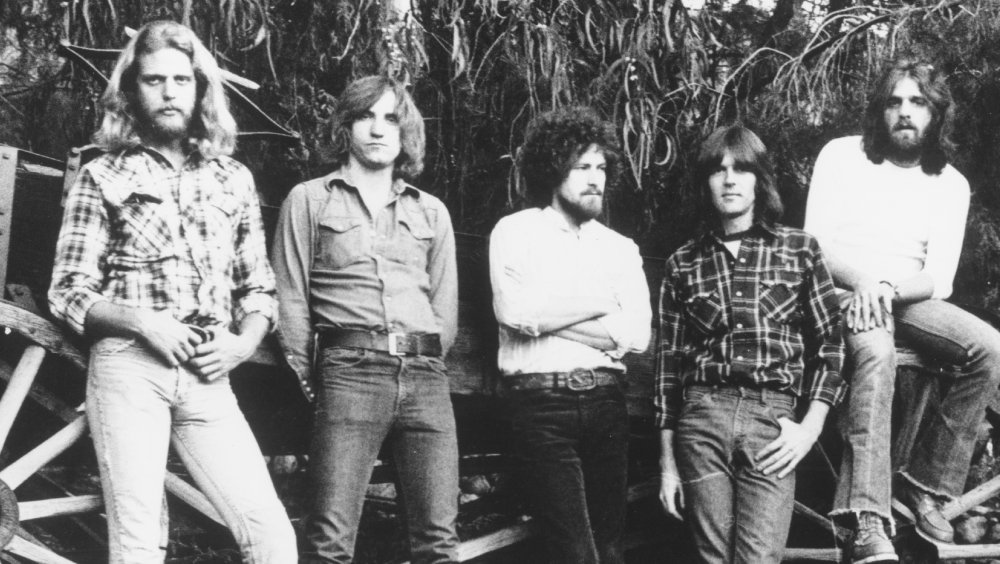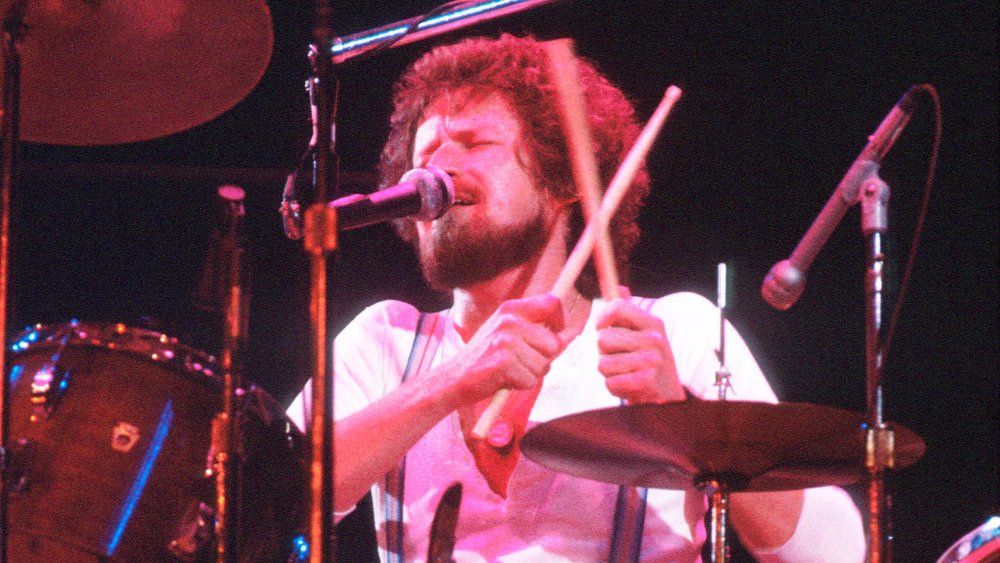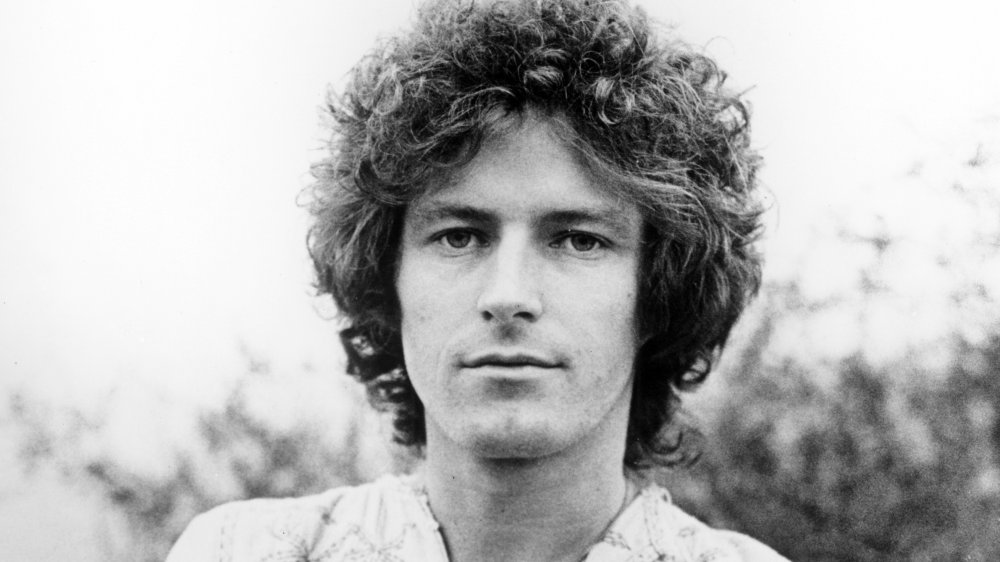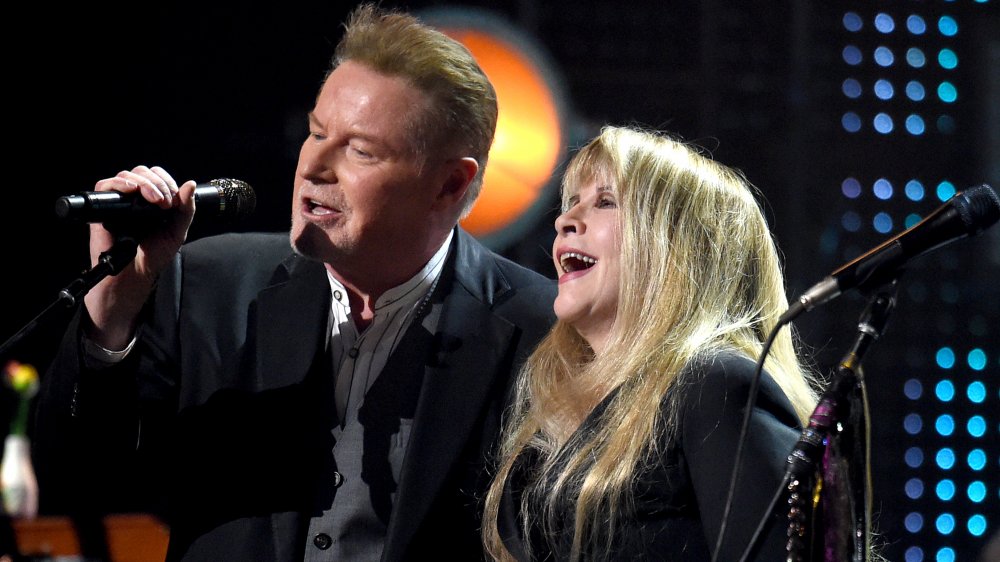The Shady Truth About The Eagles' Don Henley
Whether you love the concept of a "Greatest Hits" album or not — individual studio albums are unique works of art, complete unto themselves, radio play is just pandering to the masses, blah blah blah — there's not a lot of arguing to be done in the face of serious, mind-boggling success, like the serious, mind-boggling success of The Eagles' Greatest Hits, released in 1976 and within a week certified platinum, says Best Classic Bands. And that was just from their first four albums.
The Eagles came together in the 1970s, says Encyclopedia Britannica, originally backing up singers like Linda Ronstadt before issuing a self-titled album in 1972, reports Ultimate Classic Rock. It was a blend of country and solid rock. Founding members included Don Henley, Glenn Frey, Bernie Leadon, and Randy Meisner. Frey and Henley did most of the songwriting chores, as well as lead vocals — Henley's delivered while playing drums. That first album was an unqualified success, but for many of the fans, the band's image was solidified with 1973's Desperado, an album that perfected that blend of rock/pop/country sensibilities, combining storytelling and lyricism. It was also the beginning of the Frey-Henley songwriting team.
Henley wrote, drummed, and sang
In a 2003 interview with Cameron Crowe, posted on The Uncool, Henley talked about the roots of the album's title track. It's been covered relentlessly, perhaps most famously (and best) by Linda Ronstadt herself (sometimes it ain't what you know, but who you know .... y'know?). The roots of the song came from Henley — "a fragment," he called it. Frey came to Henley's house to write one day and Henley played the "fragment" for him — "It's really a Southern gothic thing," Henley said, citing the influence of Stephen Foster. "Glenn leapt right on it — filled in the blanks and brought structure. And that was the beginning of our songwriting partnership ... that's when we became a team."
The band itself had their own reputation for rowdy, raucous, after-show debauchery, rivalling, according to Henley, even the intrepid Led Zeppelin. Desperado cast them in a bit of an outlaw light, though the album was more metaphorical than anything, as Henley said in 1980. "In retrospect, I admit that the whole cowboy-outlaw-rocker myth was a bit bogus. ... Suddenly we were getting famous and making all this money, and it just turned our little heads around. We were living outside the laws of normality, we were out here in LA, things were kind of Western, and we just decided to write something about it to try to justify it to ourselves."
Sometimes people try to justify their actions
As bands sometimes do, they broke up — for a while, anyway — in 1980, says Louder Sound. And whatever they were trying to justify to themselves, it followed Henley after the band splintered. Part of the problem with success, particularly in the performing arts, is that most often, nobody tells them "no." Including themselves. And one misstep leads to another, whether it's an entire band of faux Desperadoes or just one guy living a life of very few consequences.
Which doesn't mean the artist doesn't think about it all, every so often. Case in point: The Broward Palm Beach News reports that Henley's solo hit, "Dirty Laundry," is sometimes described as Henley's reaction to insensitive press conduct in reporting the death of celebrities like John Belushi. While Henley often dedicates the tune in concert to people like Rupert Murdoch and Bill O'Reilly, it might actually hit closer to home for the Eagles alumnus. Back in 1980, a 911 call from Henley brought the fire department to his Los Angeles home. There they found a naked 16-year-old sex worker who'd overdosed on cocaine.
Henley has a tragic history with Stevie Nicks
Popdose (which also cites tales of Henley's love for "coke orgies") says quaaludes were involved, too. Henley pleaded no contest to a charge of contributing to the delinquency of a minor, a misdemeanor, and insisted he a) had no idea how old she was, b) they'd had no sexual contact, and c) his roadies were responsible for her drug intake. Henley was sentenced to a fine and two years' probation.
Henley's had other relationship ups and downs. Stevie Nicks of Fleetwood Mac was one romance that ended badly. When she became pregnant, Henley dumped her. She had an abortion and turned the trauma into what became a hit single, "Sara."
None of that seems to have hurt Henley's job prospects any. Forbes reports that 2019 saw the current lineup of The Eagles playing 29 concert dates, grossing $73.4 million.
The Eagles were inducted into the Rock and Roll Hall of Fame in 1998.



